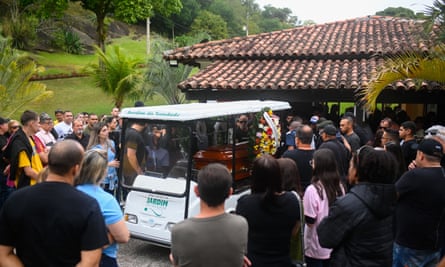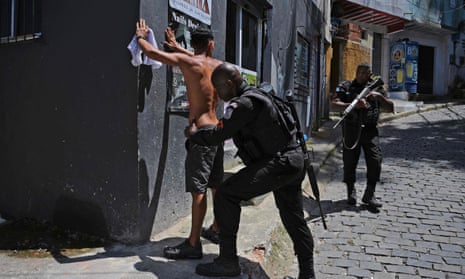The theme from Mel Gibson’s Braveheart filled the air as the man accused of helping spawn Rio’s paramilitary mafia movement was lowered into the soils of a graveyard called the Garden of Longing. Fireworks exploded overhead.
“My brother was a noble man with a magnificent heart,” said the dead man’s sibling, Natalino Guimarães, as he and hundreds of mourners prepared to say their last goodbye.
“He was truly a Braveheart. I’m a Braveheart. All these people here are Bravehearts,” Guimarães declared, motioning to the crowd outside the cemetery’s VIP chapel, many sporting caps or T-shirts emblazoned with the nickname. “We fight for the people bringing good and not evil.”
Guimarães’s “braveheart” brother was Jerônimo Guimarães Filho, a former policeman, politician and convicted paramilitary leader, who was shot dead in early August by a trio of black-clad assassins.
The murder made front-page headlines and ended a controversial life, nearly 11 years of which were spent behind bars for his alleged role in creating the Liga da Justiça (the Justice League), which would become Rio’s most feared paramilitary group.
Jerônimo Guimarães is now dead but his murder will do nothing to slow the advance of Rio’s heavily armed milícias (militias) across Brazil’s most famous city.
In the two decades since the Guimarães brothers allegedly founded the Justice League, such groups have only grown more powerful.
Rio’s three drug factions have earned international notoriety thanks to blockbuster films about gangland life such as City of God and Elite Squad. But experts say militias now pose a far graver threat to the city and – because of their political ambitions and connections, including to far-right president Jair Bolsonaro – to Brazilian democracy itself.
Last month the violence-tracking group Fogo Cruzado claimed Rio’s militias now commanded an area almost the size of Birmingham, the UK’s second biggest city, where more than 1.7 million people lived. “They have grown massively over the last few years to the extent that they are now the biggest armed group, with the greatest level of control,” said Fogo Cruzado’s director, Cecília Olliveira.
Cláudio Ferraz, the head of Rio’s organized crime squad from 2007 to 2010, called militias “one of the greatest threats to sovereignty and the democratic rule of law state in this country”.
During his mafia-fighting days, Ferraz jailed hundreds of alleged paramilitaries, including Jerônimo Guimarães, and became known as Rio’s “militia hunter”.
A 2008 parliamentary inquiry – which recommended the indictment of more than 200 people for suspected militia ties, including the then local congressman Natalino Guimarães and city councillor Jerônimo Guimarães – dealt a major blow to the mafia-style groups.
Yet 14 years later Ferraz said authorities had failed to keep up the pressure, allowing militias to grow so dominant that a similar crackdown would be fatal. “I’ve no doubt that in the current context, if I now tried to do what we did back then, I’d be eliminated,” he said.
Rio’s militias grew out of the death squads that roamed its impoverished outskirts in the 1960s and 70s, using lethal force to crack down on petty crime.
By the late 1990s they had evolved into highly organized gangs of off-duty police officers and prison guards who used guns to govern large swaths of the city, sought elected office, and grew rich selling property, stealing fuel and illegally exploiting services such as bus routes, internet and cable TV.
“Pretty much the only thing they don’t sell is the air we breathe,” said José Cláudio Souza Alves, a sociologist considered one of Rio’s leading experts on the topic.
Alves said Rio was now home to dozens of loosely connected militia groups – often called “bondes” (crews) – with a management-style hierarchy and “fabulous” authority over dozens of low-income communities.
“They get elected, they cut deals, they have inside information that helps them avoid being arrested or killed. They kill each other when their agreements collapse but the state hardly targets them. Just look at the number of militia members who are put on trial. It’s minuscule.”

Initially, such groups posed as virtuous vigilantes fighting to protect citizens from rifle-wielding cocaine traffickers peddling drugs in the favelas.
The relative of one retired paramilitary, who asked not to be named, said: “The way he saw things, drug traffickers and thieves were scumbags and scumbags aren’t humans. So by cleansing them, he was doing society a favour.
“He thought he was a hero.”
Some militia bosses adopted superhero names such as Batman to suggest their supposedly valiant motivations and invincibility. “What’s a killer’s only shortcoming? That he dies,” said Alves. “So when they name themselves after superheroes they’re telling you they’ve overcome this defect and are immortal. Superman doesn’t die. Batman doesn’t die. None of them die.”
These days few believe in such benevolence, with Rio’s militias accused of using fear and intimidation to extort residents and, increasingly, sell drugs themselves.
“They impose themselves through tyranny – and their objective is profit - from the start their goal was always profit,” said Ferraz, who questioned whether “militia” was the right name for such gangs.
“Militias are groups of civilians who arm themselves to confront a dictatorship [and fight] the aggressions of a totalitarian regime. This isn’t what’s happening in Rio.”
Over the years, the militias have made influential friends and entered the world of politics.
“If you want to talk to a [mafia] leader today you’ll need to go to the town councils, where they run departments. You’ll need to go to the state legislature. You need to go to the city hall and to congress - that’s where you’ll find the leaders,” Ferraz said.
“They won’t introduce themselves as such – but those who know, know.”
Jair Bolsonaro’s family once publicly supported such groups, calling them an effective tool against crime, and has well-documented links to major militia figures. The mother and wife of one infamous paramilitary hitman once worked for Bolsonaro’s politician son, Flávio Bolsonaro.
During a televised debate ahead of Brazil’s 30 October presidential election, the leftist frontrunner Luiz Inácio Lula da Silva hinted at such ties, telling Bolsonaro: “He knows it’s not me who has connections to paramilitaries and with organized crime – and he know who does.”
Bruno Paes Manso, the author of a book about the growing political clout of the militias, said there was no evidence that Jair Bolsonaro was directly involved in such groups. But the president’s dismantling of gun laws had been a gift to the paramilitaries he once championed, allowing them to further expand their already astonishing arsenals. “Rio is in a very deep hole indeed,” Paes Manso warned, calling for a cross-party political consensus to tackle what he called the city’s most urgent problem.
Authorities claim they are serious about fighting militias and last year trumpeted the killing of one prominent gangster called Ecko as proof.
Ferraz said such killings were ineffective. “It’s empty talk … to convince voters they’re extremely tough on crime,” he said, arguing that unless highly-structured task-forces with political backing were allowed to attack the groups’ finances nothing would improve.
Quite what lay behind Guimarães’s assassination outside a community centre he ran in west Rio remains a mystery. Police reportedly suspect the hit was ordered by a rival from one of Rio’s largest militias. A phone tap caught one gangster calling Guimarães a “nuisance” who needed fixing.
At his funeral, Guimarães’s brother denied involvement in organized crime and the “monstrous acts” attributed to them by the “rotten press”. “My brother was a human being of the highest quality,” he insisted before his sibling was laid to rest.
As the militias tighten their grip, Ferraz said he was losing hope in the city he once served, beset by political corruption and organized crime. He feared the militias might one day achieve a complete monopoly over Rio’s underworld.
“I want to leave … My goodness, it’s madness what we’ve gone through here,” he sighed. “This is a wonderful state with massive potential but unfortunately [what’s happening] is just mind-boggling.”
Ferraz pointed to the four former Rio state governors who had been jailed for corruption and the senior police officers imprisoned for wrongdoing. Last month, the former head of Rio’s civil police, a Bolsonaro ally who was seeking election to congress in this week’s election, was arrested for allegedly colluding with Rio’s mafia bosses.
“Damn it,” the retired militia hunter said. “It’s a disaster.”
